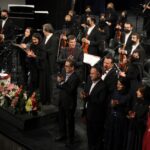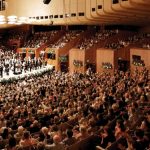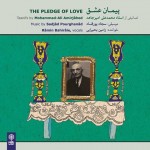The National Instruments Orchestra of Iran performed its first concert amid much hope and anxiety on July 18, 2015. The Orchestra is founded by Roudaki Cultural and Arts Foundation which is a semi-private foundation in Iran. The Arts Director for the National Instruments Orchestra of Iran is cand the Orchestra Executive Director is Sadjad Pourghand.
Tag Archives: Hamid Motebassem
Latest posts
- Transition to Enlightenment: Six Lectures on Mozart’s String Quartets (5)
- Nasser Masoudi: The Voice of Gilan and a Legacy of Iranian Music
- Farhad Poupel: The Voice of the Shahnameh in the Orchestras Around the World
- Five Major Myths About Mozart’s Life
- Bahma Rajabi Passed Away!
- Reza Vohdani; Unveiling unpublished works, preservation of Iranian classical music
- Ahmad Pejman Passed Away!
- Timeless or Timely: The Role of Historical Context in Defining Artistic Value
- Leading the Charge in Censorship
- The Legacy of Khosrow Jafarzadeh
- Transition to Enlightenment: Six Lectures on Mozart’s String Quartets (4)
- Fereydoun Shahbazian, An Iranian Musical Icon Passed Away
From Past Days…

Motherland Orchestra Broke the Spell of the Covid-19 Restrictions
The Motherland Orchestra staged the first concert since the outbreak of the pandemic under the baton of Nezhat Amiri. The orchestra went on stage on December 23-24, 2021 in memory of Rouhollah Khaleghi and Golnoush Khaleghi at Vahdat Hall, Tehran, Iran. Since the pandemic outbreak, concerts were held online and restrictions were imposed on in-person concerts.

A note on “Illusion or Ingenuity” article
The author of the “Illusion or Ingenuity” article, who is apprehensive of the future of the Music in Iran, enumerates some symptoms of the music weakening in the country for example decreasing in the quality of the music as well as lack of the innovation in creating them, a gradual decline in the music public taste and the drop in the application of layered sound and polyphony in music. He explains that one reason for this gradual weakening might be our unawareness of the fact that we are not so intelligent nation. He believes that we, Iranians, have a comprehensive “Illusion of the high national intelligence “that make us ignorant of the unfavorable realities of our music and consequently no searching for the remedy is taking place. His point of view brings to the mind a patient who thinks he is healthy, therefore delays the treatment and finally is killed by the disease. The author also refers to the national difficulties which gradually will lower the national intelligence score such as the increased rate of the immigration and brain drain, low quality of the nutrition, incompetence of the education system and etc and predicts that the condition of the music of Iran might deteriorate in the future because of the mentioned illusion of its great status.

Leading the Charge in Censorship
Davoud Pirnia, writer and musicologist was the founder of “Golha” (Flowers of Persian Song and Music) programs on Tehran Radio (1956-1966). He received his early education from his father, Hassan Pirnia (Moshir al-Douleh), and several tutors of the time (Taraghi, interview, July 1989) and continued his studies at Saint Louis School in Tehran and then in Switzerland and graduated in law. While studying law, Pirnia got acquainted with European classical music. Upon returning to Iran, he was employed by the Ministry of Justice and founded the Lawyers’ Guild. Then he was transferred to the Ministry of Finance and established the Department of Statistics in this ministry. Later, he became the head of the state inspection office at the Prime Ministry; he was, then, promoted to the position of the Deputy Prime Minister (Navab Safa, interview, August 1999)

Transition to Enlightenment: Six Lectures on Mozart’s String Quartets (4)
The collaboration between Mozart and Haydn blossomed during the late 18th century in Vienna, a city that served as the epicenter of musical innovation. Amidst this vibrant cultural milieu, the two composers developed a profound friendship that extended beyond mere professional admiration. This connection is reflected in the six string quartets dedicated by Mozart to Haydn, aptly known as the “Haydn Quartets.”

Farhad Poupel: The Voice of the Shahnameh in the Orchestras Around the World
In an era when almost no trace of contemporary Iranian music can be heard in international concert halls, except (so-called!) avant-garde works that owe their existence solely to the fashionable slogans of the “pseudo-intellectual” crowd who have seized the already meager resources for performing classical music from the true artists of the field, the numerous performances of Farhad Poupel’s works shine as a ray of hope for lovers of sincere musical art. Without resorting to trendy slogans, he has kept the flame of Iranian classical music alive purely through the power of his artistry.

The Structure of Kurdistan Daf (V)
ehrouz Mohammadi, “Daf and its feasts in Ghaderieh’s Tekyeh” mentions that the outer thickness of arch where studs are located, [is] between one to one and a half centimeters (Mohammadi, 2001: 12). The thickness of arch should be gradually reduced from the installation place of rings to skin (Avazeh of Daf) to create a high volume, clear sound from Daf; also, the connection of arch to skin should not be less than one millimeter, because in this case the skin will be torn due to the sharpness of the wood (Mogharab Samadi, 2009: 79-78). The thickness of wood on the skin side is about two to three millimeters (Tohidi, 2002: 79).

Principles of Violin Playing (IX)
4.3.1. To practice playing of doubles of notes involving two different fingers, each note is played at separate bows with slow tempo, each note is played perfectly regarding its bass and tenor sounds and then the considered double is played at another bow while considering the resulted sound of the double.

The Role of Arts in Development of Societies
Mr. Mohsen Ghanebasiri, author and critic in the field of economy, culture and arts, as the next speaker, highlighted the role of arts, specially the music, in development of societies: “As far as the individual upbringing is concerned, a newborn baby is absolutely dependent. The relation between the baby and the parents is based on orders. There is lots of relativity in these orders; therefore, they are political orders. In the economy, however, the relations are mutual and based on common logic; hence, the formation of the concepts of democracy and individuality.

Gholam Reza Khan Minbashian: a pioneer in Iranian music (II)
Gholamreza Khan Minbashian taught courses such as organology, orchestration of military music and harmony based on the books which were translated from French into Persian with the help of Aliakbar Mozayyan-o-Dolleh (1846-1932).

“Pledge of Love”
The “Pledge of Love” is the first album in a series composed based on the tasnifs by the renowned Iranian tasnif-maker Mohammad Ali Amir Jahed and recorded by Sahba Kohan Ensemble with Ramin Bahiraie as signer.